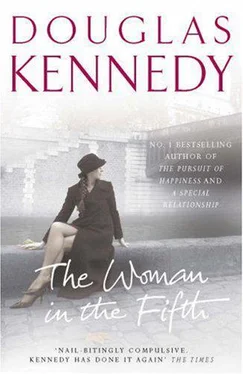‘Told by whom?’
‘It is not important.’
Then he disappeared into a back room.
Why didn’t I walk away then and there? Why didn’t I execute an about-face and vanish? I could have gone home and cleared out my chambre in a matter of minutes, and pitched up somewhere else in Paris. Surely there were grubbier streets in grubbier quartiers , where it was possible to find another shitty room in which I could eke out a living until the money ran out.
And then? And then?
That was the question which kept plaguing me as I sat at the little bar on the rue de Paradis, nursing a pression and wishing that the barmaid was available. I found myself studying the curve of her hips, the space between her breasts that was revealed by her V-neck T-shirt. Tonight I wanted sex for the first time since Susan had thrown me out all those months ago. It’s not that I hadn’t had a sexual thought since then. It’s just that I had been so freighted with the weight of all my assorted disasters that the idea of any sort of intimacy with someone else seemed like a voyage into a place that I now associated with danger. But never underestimate the libido — especially when it has been oiled with a couple of beers. As I found myself looking over the barmaid, she caught my appraising stare and smiled, then flicked her head toward a beefy guy with tattoos who had his back to us as he pulled a croque monsieur out of a small grill. The nod said it all: I’m taken. But the smile seemed to hint an ‘Alas’ before that statement. Or, at least, that’s what I wanted to believe. Just as I wanted to believe that Kamal ‘got himself killed’ because he owed somebody money, or he was in on a drug deal that had gone wrong, or he’d been fingering the till at the cafe, or he’d looked the wrong way at some woman. Or …
A half-dozen other scenarios filled my head … along with another pervasive thought. Remember what Kamal told you when he first offered you the job: ‘That is of no concern of yours.’ Good advice. Now finish the beer and get moving. It’s nearly midnight. Time to go to work.
Later that night, I opened my notebook and a piece of paper fell out of one of its back pages. It was the scrap on which I had written Lorraine L’Herbert’s phone number. I stared at it. I thought, What can I lose? It’s just a party, after all .
‘It’s not a party,’ said the uppity little man who answered L’Herbert’s phone the next afternoon. He was American with a slightly simpering voice and a decidedly pompous manner. ‘It’s a salon.’
Thanks for the semantical niceties, pal.
‘Are you having one this week?’
‘ Comme d’habitude .’
‘Well, can I book a place?’
‘If we can fit you in. The list is very, very tight, I’m afraid. Your name, please?’
I told him.
‘Visiting from … ?’
‘I live here now, but I’m from Ohio.’
‘People actually live in Ohio?’
‘The last time I looked.’
‘What’s your line of endeavor?’
‘I’m a novelist.’
‘Published by … ?’
‘That’s pending.’
He issued a huge sigh, as if to say, Not another wouldbe writer.
‘Well, you know that there is a contribution of twenty euros. Please arrive with it in an envelope, on which your name is clearly printed. Take down the door code now and don’t lose it, because we don’t answer the phone after five p.m. on the day of the salon. So if you misplace it, you will not gain entry. And the invitation is for yourself only. If you show up with anyone else, both of you will be turned away.’
‘I’ll be alone.’
‘No smoking, by the way. Madame L’Herbert hates tobacco. We like all our guests to arrive between seven and seven thirty p.m. And dress is smart. Remember: a salon is theater. Any questions?’
Yeah. How do you spell ‘up your ass’?
‘The address, please?’ I asked.
He gave it to me. I wrote it down.
‘Do come prepared to dazzle,’ he said. ‘Those who shine get asked back. Those who don’t …’
‘I’m a total dazzler,’ I said.
He laughed a snide laugh. And said, ‘We’ll see about that.’
A BIG FUCK-OFF apartment near the Pantheon.
Those words came back to me that Sunday evening as I walked up the boulevard Saint-Michel in the direction of the Luxembourg Gardens. I had dressed carefully for the occasion: a black shirt and black pants and a black leather jacket I had bought at that second-hand shop on the faubourg Saint-Martin the previous day. It was a cold night, and the jacket didn’t put up much resistance against the cutting wind. I was around fifteen minutes early, so I stopped in a nearby cafe and ordered a whisky. Not a single malt or some other premium brand. Just a standard Scotch. When the waiter deposited the little bill with the drink and I turned it over and saw that it cost eleven euros, I tried to stop myself from gasping. Eleven euros for a shot of whisky? Welcome to the Sixth.
I would have spent a good hour nursing the whisky and reading the Simenon novel, La neige etait sale , that I had just picked up. But mindful of the seven-thirty cut-off point, I finished the Scotch, placed the necessary money on the table, tried not to think too hard about how eleven euros could buy me a day’s food, and headed off to Lorraine L’Herbert’s salon.
The address was 19 rue Soufflot. Tres haussmannien . You walk around Paris, you see dozens of examples of Baron Haussmann’s architectural left-behinds. This one was no different from the others: a large, formidable building, around six stories tall, with the requisite small baroque flourishes. Only given its location — just down the street from the Pantheon — and its elegant lobby, it was clear that this immeuble haussmannien was also a testament to imposing grand bourgeois values.
Which meant that, even before I had entered Lorraine L’Herbert’s building, I felt shabby and humbled by it.
I punched in the code. The door opened with a click. Inside was a speakerphone. I picked it up and pushed the button marked with her name. It was answered by the American who had vetted me on the phone. Voices could be heard in the background.
‘Name, please … Votre nom, s’il vous plait ,’ he said.
I gave it to him.
‘One second, please … un instant …’ Then: ‘Fourth floor left … quatrieme etage gauche .’
The elevator was a small gilded cage. I took it to the top floor. Before it reached four, I could hear the sounds of loud conversation. When the elevator opened, I turned left and rang the bell. The door swung back. A short man dressed in black slacks and a black turtleneck was standing sentry. He had close-cropped hair and carried a stylish stainless-steel clipboard and an expensive pen.
‘Monsieur Ricks?’
I nodded.
‘Henry Montgomery. Madame L’Herbert’s assistant. Your envelope, please.’
I reached into my pocket and pulled it out and handed it over. He checked that my name was — as instructed — printed on its front. Having verified that, he said, ‘Coats in the first room down the corridor to your left, food and drink dans la cuisine . But after you’ve deposited your coat, you must come back here so I can take care of the introduction to Madame. D’accord? ‘
I nodded again — and followed Montgomery’s pointed finger down the corridor. It was a very long corridor, with high ceilings. The walls were white. There was a big abstract canvas — in five sections — that covered much of the wall space. Each panel was a varying shade of green, the outer ones lightish in timbre, the inner ones amalgamating nearblackish hue. From my fifteen-second assessment, it looked like Imitation Klein or Rothko, and was showing its thirty years badly.
Читать дальше












